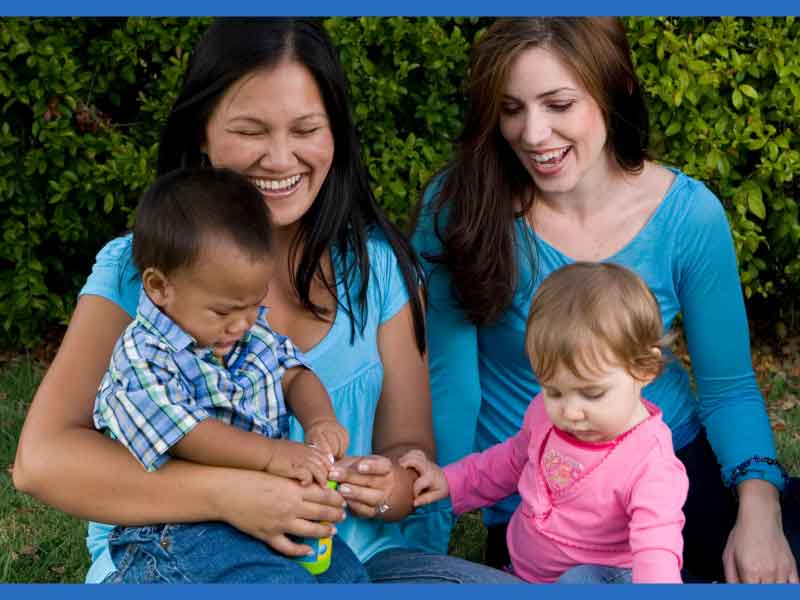
Support can come from various sources—friends, family members, and associates. However, receiving support from people with lived experience can be especially helpful.

Life is full of uncertainties, ups and downs, and challenges. Few things make that more evident than parenting. Since parenting doesn’t come with an instruction manual, we rely on our judgment and instincts for guidance, but that doesn’t always provide clear answers. So, we lean on others for support when we feel out of our element or just need to vent.
Support can come from various sources—friends, family members, and associates. However, receiving support from people with lived experience can be especially helpful. In recent years, technology, such as social media platforms, has broadened opportunities to connect with people around the globe who face similar challenges. People in support groups share their journeys, lessons learned, and wisdom. That support, whether in person or online, can be what gets us through the day.
It seems as though there are support groups for just about any type of parenting issue, and they can prove invaluable when we encounter situations that may make us feel out of our element, particularly when it comes to health issues. For example, there are online support groups for parents whose children have cancer, intellectual disabilities, diabetes, asthma, physical disabilities, etc. Support groups offer everything from practical advice to a shoulder to cry on.
The Unique Challenges of Rare Parents
But what about “Rare Parents”—those parenting children with rare or undiagnosed conditions? What if your child’s condition has yet to be diagnosed or is so rare there’s no Facebook group to join?
Arriving at a diagnosis can take months or years. Sometimes a diagnosis isn’t found. But, thanks to advancing genomics, conditions are diagnosed more than ever before. For example, exome sequencing analyzes the protein-coding genes where many genetic disorders are located, and whole-genome sequencing scans a person’s entire DNA to identify genetic variations.
Even if you receive a diagnosis, there’s often not a definitive treatment for many rare diseases. As challenging as it can be to get the correct diagnosis for a child with a rare condition and find the right doctor who understands the condition and can make informed treatment decisions, that’s only the beginning of a family's journey.
Being a Rare Parent takes a toll, even if you’re the most positive person in the world. Children with rare or undiagnosed conditions require extra care and attention. Life is filled with constant stress, hours of doctor’s appointments, juggling information, and navigating the healthcare system, not to mention all life’s everyday challenges and distractions. It can feel like you’re playing a game without knowing any of the rules and wearing a blindfold.
You can’t sugarcoat the reality of raising a child with a rare or undiagnosed condition. It’s hard, stressful, and often heartbreaking. The pressure can be relentless.
Having a child with an undiagnosed or medically complex rare condition can be extremely isolating and overwhelming. Parents may feel that they have to cobble everything together from scratch to ease the sometimes debilitating pressure to figure out how to care for their children and themselves.
Who can you turn to for practical advice? Who can empathize with the heartwrenching medical decisions you may need to make? Who understands what you’re going through?
You’re Not Alone
Although it may seem that you’re on a raft in the middle of an ocean with no land in sight and that no one else in the world understands, there are opportunities to connect with others experiencing similar situations.
Just as medical discoveries continue making it easier to pinpoint uncommon conditions, there’s been a significant rise in online communities where parents raising children with rare and undiagnosed conditions find others like them.
Connecting with others can be powerful. Regardless of whether your child shares the same condition or has a diagnosis, connecting with people who are on a similar journey of frustration and hope can be game-changing.
Parents of children with rare and undiagnosed conditions share everything from effective ways to stop seizures to soothing nonverbal children, suggestions about therapies that have worked for their child, and finding respite care. Sometimes simply sharing a compassionate message can make a huge difference.
There are various ways to find support networks, including well-known social media platforms, such as Facebook. Facebook and other social media platforms have groups that allow families to connect. You can also be part of the conversation by following @ncats_nih_gov and @ORDR. In addition, the online international community for rare diseases, RareConnect, has created a global, multi-lingual community for undiagnosed conditions.
Annette, the mother of TGen Center for Rare Childhood Disorders (the Center) patient Emma, recently shared that working with the experts at the Center offered medical help and put her in touch with other patient families. Fortunately, the Center was able to provide a diagnosis for Emma. Of course, having a diagnosis was a great comfort to the family. Still, Annette shared that connecting with other families was equally comforting because it let them know they weren’t alone.
Help Make a Difference
Your support enables the Center to provide genomic testing for families at no charge. Your cash donation, participation in a fundraising event, gifts of stock, or securities all allow the Center to continue its groundbreaking research leading to discoveries that mean a better future for children with rare childhood conditions. Even simply sharing the message with friends, family, and associates can help provide families with knowledge and support.